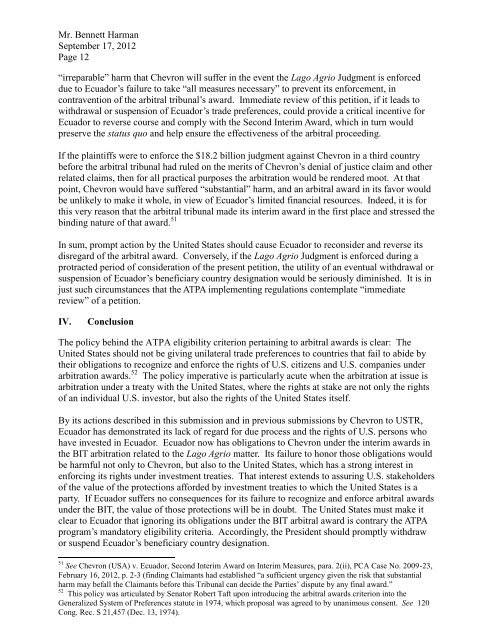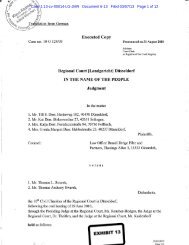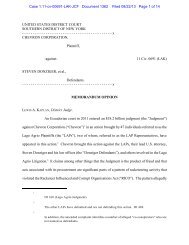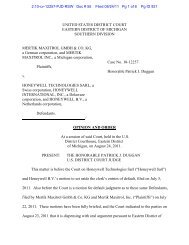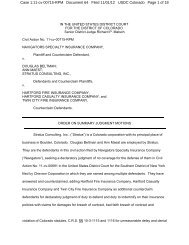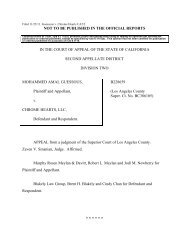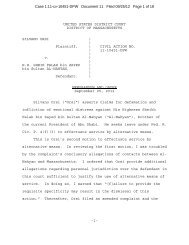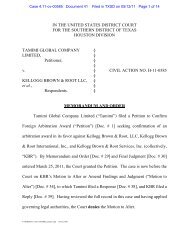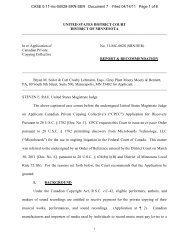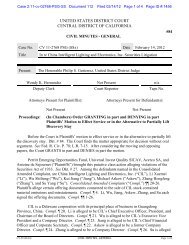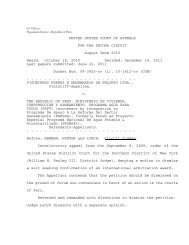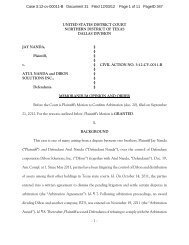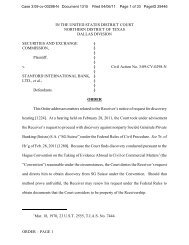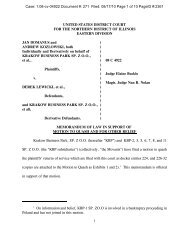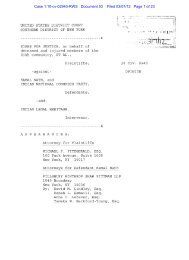Chevron's petition - Letters Blogatory
Chevron's petition - Letters Blogatory
Chevron's petition - Letters Blogatory
Create successful ePaper yourself
Turn your PDF publications into a flip-book with our unique Google optimized e-Paper software.
Mr. Bennett Harman<br />
September 17, 2012<br />
Page 12<br />
“irreparable” harm that Chevron will suffer in the event the Lago Agrio Judgment is enforced<br />
due to Ecuador’s failure to take “all measures necessary” to prevent its enforcement, in<br />
contravention of the arbitral tribunal’s award. Immediate review of this <strong>petition</strong>, if it leads to<br />
withdrawal or suspension of Ecuador’s trade preferences, could provide a critical incentive for<br />
Ecuador to reverse course and comply with the Second Interim Award, which in turn would<br />
preserve the status quo and help ensure the effectiveness of the arbitral proceeding.<br />
If the plaintiffs were to enforce the $18.2 billion judgment against Chevron in a third country<br />
before the arbitral tribunal had ruled on the merits of Chevron’s denial of justice claim and other<br />
related claims, then for all practical purposes the arbitration would be rendered moot. At that<br />
point, Chevron would have suffered “substantial” harm, and an arbitral award in its favor would<br />
be unlikely to make it whole, in view of Ecuador’s limited financial resources. Indeed, it is for<br />
this very reason that the arbitral tribunal made its interim award in the first place and stressed the<br />
binding nature of that award. 51<br />
In sum, prompt action by the United States should cause Ecuador to reconsider and reverse its<br />
disregard of the arbitral award. Conversely, if the Lago Agrio Judgment is enforced during a<br />
protracted period of consideration of the present <strong>petition</strong>, the utility of an eventual withdrawal or<br />
suspension of Ecuador’s beneficiary country designation would be seriously diminished. It is in<br />
just such circumstances that the ATPA implementing regulations contemplate “immediate<br />
review” of a <strong>petition</strong>.<br />
IV. Conclusion<br />
The policy behind the ATPA eligibility criterion pertaining to arbitral awards is clear: The<br />
United States should not be giving unilateral trade preferences to countries that fail to abide by<br />
their obligations to recognize and enforce the rights of U.S. citizens and U.S. companies under<br />
arbitration awards. 52 The policy imperative is particularly acute when the arbitration at issue is<br />
arbitration under a treaty with the United States, where the rights at stake are not only the rights<br />
of an individual U.S. investor, but also the rights of the United States itself.<br />
By its actions described in this submission and in previous submissions by Chevron to USTR,<br />
Ecuador has demonstrated its lack of regard for due process and the rights of U.S. persons who<br />
have invested in Ecuador. Ecuador now has obligations to Chevron under the interim awards in<br />
the BIT arbitration related to the Lago Agrio matter. Its failure to honor those obligations would<br />
be harmful not only to Chevron, but also to the United States, which has a strong interest in<br />
enforcing its rights under investment treaties. That interest extends to assuring U.S. stakeholders<br />
of the value of the protections afforded by investment treaties to which the United States is a<br />
party. If Ecuador suffers no consequences for its failure to recognize and enforce arbitral awards<br />
under the BIT, the value of those protections will be in doubt. The United States must make it<br />
clear to Ecuador that ignoring its obligations under the BIT arbitral award is contrary the ATPA<br />
program’s mandatory eligibility criteria. Accordingly, the President should promptly withdraw<br />
or suspend Ecuador’s beneficiary country designation.<br />
51 See Chevron (USA) v. Ecuador, Second Interim Award on Interim Measures, para. 2(ii), PCA Case No. 2009-23,<br />
February 16, 2012, p. 2-3 (finding Claimants had established “a sufficient urgency given the risk that substantial<br />
harm may befall the Claimants before this Tribunal can decide the Parties’ dispute by any final award.”<br />
52 This policy was articulated by Senator Robert Taft upon introducing the arbitral awards criterion into the<br />
Generalized System of Preferences statute in 1974, which proposal was agreed to by unanimous consent. See 120<br />
Cong. Rec. S 21,457 (Dec. 13, 1974).


